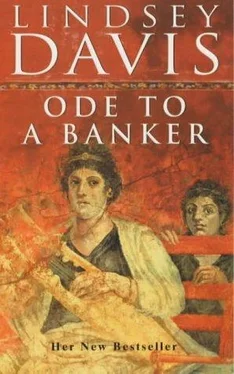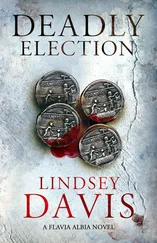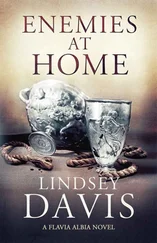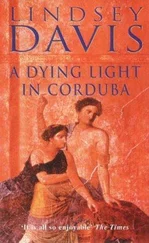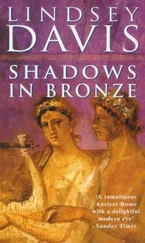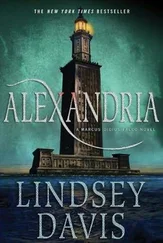Lindsey Davis - Ode to a Banker
Здесь есть возможность читать онлайн «Lindsey Davis - Ode to a Banker» весь текст электронной книги совершенно бесплатно (целиком полную версию без сокращений). В некоторых случаях можно слушать аудио, скачать через торрент в формате fb2 и присутствует краткое содержание. Жанр: Исторический детектив, на английском языке. Описание произведения, (предисловие) а так же отзывы посетителей доступны на портале библиотеки ЛибКат.
- Название:Ode to a Banker
- Автор:
- Жанр:
- Год:неизвестен
- ISBN:нет данных
- Рейтинг книги:4.5 / 5. Голосов: 2
-
Избранное:Добавить в избранное
- Отзывы:
-
Ваша оценка:
- 100
- 1
- 2
- 3
- 4
- 5
Ode to a Banker: краткое содержание, описание и аннотация
Предлагаем к чтению аннотацию, описание, краткое содержание или предисловие (зависит от того, что написал сам автор книги «Ode to a Banker»). Если вы не нашли необходимую информацию о книге — напишите в комментариях, мы постараемся отыскать её.
Ode to a Banker — читать онлайн бесплатно полную книгу (весь текст) целиком
Ниже представлен текст книги, разбитый по страницам. Система сохранения места последней прочитанной страницы, позволяет с удобством читать онлайн бесплатно книгу «Ode to a Banker», без необходимости каждый раз заново искать на чём Вы остановились. Поставьте закладку, и сможете в любой момент перейти на страницу, на которой закончили чтение.
Интервал:
Закладка:
He just held his cup. He seemed in a daze, malleable – but perhaps unreliable too.
'Let's do some scene setting – at what point did you arrive back?'
He had to search for breath to answer me. He dragged out his words: 'I came back at midday. During the fuss, but I did not realise that at first.'
I swigged some juice and tried to pep him up. 'How far had things got – were the vigiles already at the house?'
'Yes; they must have been indoors. I thought there was rather a crowd outside, but I must have been preoccupied.
'With what?' I grilled him sternly.
'Oh… the meaning of life and the price of ink.' Sensing he might be in trouble, Euschemon woke up a bit. 'How hot was the weather, what colour olives had I chosen for my lunchpack, whose damned dog had left us a message on the pavement right outside the shop. Intellectual pursuits.' He had more of a sense of humour than I had previously realised.
'Surely your staff knew what was going on indoors?'
'No. In fact, nobody had heard any noise. They would have noticed the fracas in the street from the shop, but they were all in the scriptorium. The lads were battened down, you see, just having their lunchbreak.'
'Was the scroll-shop closed then?'
'Yes. We always pull the rolling door across and shut light down. The scribes have to concentrate so hard when they are copying, they need a complete full stop. They get their food. Some play dice, or they have a nap in the heat of the day.'
'Is the shutter actually locked in place?'
'Have to do it, or people try to force their way in even though they can see we have packed up for lunch. No consideration-'
'So nobody could have come in that way – or gone out?'
He realised I meant the killer. 'No,' he said sombrely.
'Would the shop have closed pretty early?'
'If I know the scribes, and given that I myself was not there, yes.'
'Hmm. So around the time of the death, that exit was blocked off…' If the killer made no attempt to use that route, maybe he knew the scriptorium routine. 'So how did you get indoors when you returned?'
'I banged on the shutter.'
'They unlocked again?'
'Only because it was me. I ducked in, and we jammed it back.'
'And when you arrived, the staff did not seem at all disturbed?'
'No. They were surprised when I asked if they knew what was going on in the street. I had realised the crowd was outside the master's house door -'
'Where's that?'
'Further down. Past the bootmender. You can see the portico.' I squinted round; beyond the scriptorium and another shop entrance, I noted important stonework intruding onto the pavement. 'I was going to go and speak to Chrysippus about it when one of the vigiles burst in, from the house corridor.'
'By that time he was well dead. So all the previous action had been muffled? You were out, and the scribes missed everything until after the body's discovery?' Euschemon nodded again, still like a man dreaming. 'It have to check that nobody came through the scriptorium after Chrysippus went indoors,' I mused.
'The vigiles asked us that,' Euschemon told me. 'The scribes all said they saw nobody.'
'You believe them?'
He nodded. 'They would have been glad to be left in peace.'
'Not happy workers?'
'Ordinary ones.' He realised why I was probing. 'They do the job, but they like it best with no supervisor on their backs. It's natural.'
'True.' I drained my cup. 'Did you go in and see the body?'
He nodded, very slowly. The horror had yet to leave him. Maybe it never would. His life had paused today, at that moment when a keyed-up vigilis rampaged down the corridor and interrupted the quiet lunchbreak. He would probably never entirely recapture the old rhythms of his existence.
He stared at me. 'I had never seen anything like it,' he said. 'I couldn't -' He gave up, waving his hands helplessly, lost for words.
I let him recover for a moment, then tackled him on more general background: 'I have to find out who did it. Give me some help, will you. Start with the business. It's doing well, apparently?'
Euschemon drew back slightly. 'I only deal with the authors and organise the copyists.'
'Man management.' I was being polite, but relentless. 'So did any of the men you managed have anything against our victim?'
'Not the scribes.'
'The authors?'
'Authors are a complaining lot, Falco.'
'Any complaints specifically?' He shrugged, and I answered for myself: 'Poor payment and dismissive critiques!' He pulled a slight face, acknowledging the truth of it.'No grudge important enough to make a creative person kill?'
'Oh, I shouldn't think so. You don't lose your temper just because your writing is poorly received.'Really?
'So how were sales?' I asked lightly.
Euschemon replied in a dry tone, 'As usual: if you listen to people who commission material, they have a lively stable of writers and are expecting shortly to ruin their competitors. The competitors, however, will accuse them of teetering on the brink of bankruptcy. If you ask the scroll-shops, life is a long struggle; manuscripts are hard to come by at reasonable prices and customers don't want to know. If you look around, people are nonetheless reading – although probably not reading what the critics are praising.'
'So who wins?'
'Don't ask me. I work in a scriptorium – for a pittance.'
'Why do you do it then? Are you a freedman of Chrysippus?'
'Yes, and my patron gives me a lot of responsibility.'
'Job satisfaction is so wonderful! You're very loyal. And trustworthy, and useful – is that all?'
'Love of literature,' he said. I bet. He could just as well have been selling anchovies or cauliflowers.
I changed elbows, giving myself a view up the Clivus Publicius instead of down it. 'So. The scroll business would appear to be doing well. Patronage pays.' Euschemon did not comment. 'I saw the house,' I pointed out. 'Very nice!'
'Taste and quality,' he agreed.
'Not so sure that applies to the wife,' I suggested.
'He thought so.'
'True love?'
'I don't want to gossip. But she would not kill him. I don't believe that.'
'Were they happy? Old man and his darling? Was it solid? Was it real?'
'Real enough,' said Euschemon. 'He left a wife of thirty years for Vibia. The new marriage meant everything to him – and Vibia relished what she had achieved.'
'Define it?'
'A powerful man, with money and social position, who was publicly devoted to her. He took her around and showed her off -'
'And he let her spend? All a woman could desire! So did she have a lover too?' Euschemon pulled a face, revolted by my cynicism. We would see. I smiled wryly. 'So you don't think Vibia had a reason to kill him? Not even for the money?'
He looked even more shocked. 'Oh no! That's horrible, Falco.'
'Pretty common too,' I disillusioned him.
'I don't want to discuss this.'
'Then tell me about the first wife, and the darling son.'
'Lysa,' he began carefully, 'is a tough woman.'
'The wife of thirty years? They tend to be. She kept Chrysippus in order – until Vibia snaked into his life?'
'Lysa had helped him build his business empire.'
'Aha!'
'And is, of course, the mother of his son,' Euschemon said.
'Vengeful?'
'She opposed the divorce, I heard.'
'But she had no choice. In Rome divorce is a fact, the moment one party withdraws from a marriage. So, she was cruelly abandoned after devoting her life to Chrysippus' interests. That would have enraged her. Was Lysa sufficiently vengeful to kill him?'
'She had a lot to say when the split happened. But I believe she had accepted the situation,' protested Euschemon. Even he could hear it sounded feeble, obviously.
'What about Diomedes? Bit of a mother's boy?'
Читать дальшеИнтервал:
Закладка:
Похожие книги на «Ode to a Banker»
Представляем Вашему вниманию похожие книги на «Ode to a Banker» списком для выбора. Мы отобрали схожую по названию и смыслу литературу в надежде предоставить читателям больше вариантов отыскать новые, интересные, ещё непрочитанные произведения.
Обсуждение, отзывы о книге «Ode to a Banker» и просто собственные мнения читателей. Оставьте ваши комментарии, напишите, что Вы думаете о произведении, его смысле или главных героях. Укажите что конкретно понравилось, а что нет, и почему Вы так считаете.
